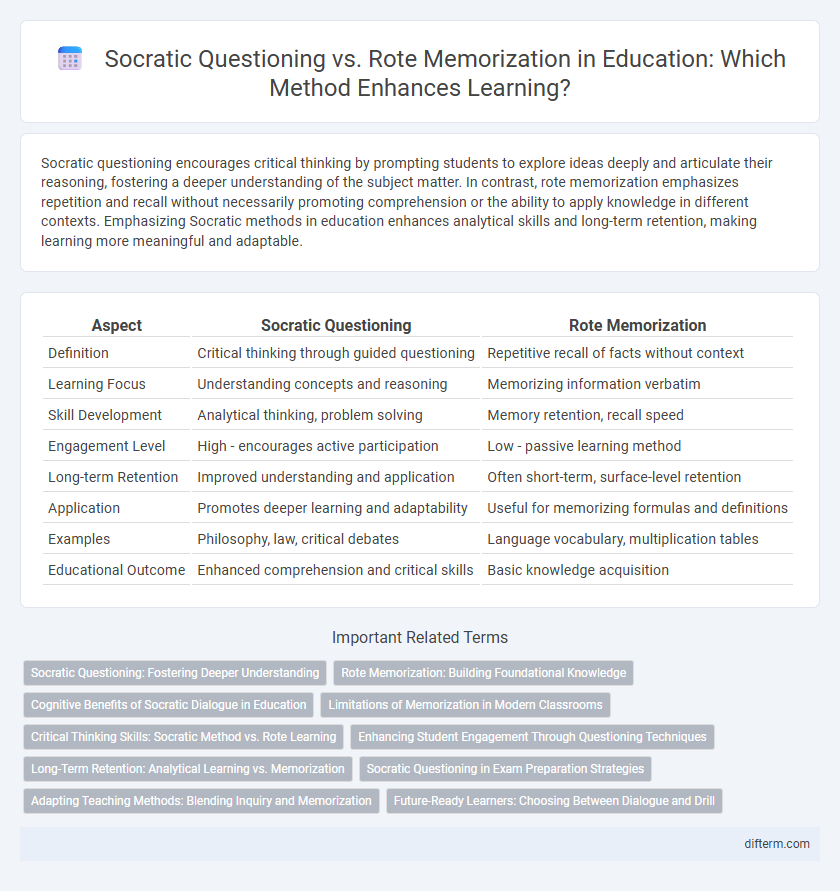Socratic questioning encourages critical thinking by prompting students to explore ideas deeply and articulate their reasoning, fostering a deeper understanding of the subject matter. In contrast, rote memorization emphasizes repetition and recall without necessarily promoting comprehension or the ability to apply knowledge in different contexts. Emphasizing Socratic methods in education enhances analytical skills and long-term retention, making learning more meaningful and adaptable.
Table of Comparison
| Aspect | Socratic Questioning | Rote Memorization |
|---|---|---|
| Definition | Critical thinking through guided questioning | Repetitive recall of facts without context |
| Learning Focus | Understanding concepts and reasoning | Memorizing information verbatim |
| Skill Development | Analytical thinking, problem solving | Memory retention, recall speed |
| Engagement Level | High - encourages active participation | Low - passive learning method |
| Long-term Retention | Improved understanding and application | Often short-term, surface-level retention |
| Application | Promotes deeper learning and adaptability | Useful for memorizing formulas and definitions |
| Examples | Philosophy, law, critical debates | Language vocabulary, multiplication tables |
| Educational Outcome | Enhanced comprehension and critical skills | Basic knowledge acquisition |
Socratic Questioning: Fostering Deeper Understanding
Socratic questioning promotes critical thinking by encouraging students to analyze, evaluate, and synthesize information rather than merely recalling facts. This method enhances comprehension and retention by engaging learners in thoughtful dialogue and reflection, fostering a deeper level of understanding. Unlike rote memorization, Socratic questioning cultivates intellectual curiosity and the ability to apply knowledge across various contexts.
Rote Memorization: Building Foundational Knowledge
Rote memorization facilitates the rapid acquisition of foundational knowledge by enabling learners to recall essential facts and procedures quickly, which supports more complex cognitive tasks later. It is particularly effective for subjects requiring precise information retention, such as language vocabulary, mathematical formulas, and historical dates. While it lacks emphasis on critical thinking, rote memorization ensures students have the necessary base to engage in deeper analytical skills, including Socratic questioning.
Cognitive Benefits of Socratic Dialogue in Education
Socratic questioning enhances critical thinking by encouraging students to analyze, evaluate, and synthesize information rather than merely recall facts. This method promotes deeper understanding and retention by engaging cognitive processes such as metacognition and active problem-solving. Research demonstrates that learners exposed to Socratic dialogue exhibit improved reasoning skills and greater intellectual flexibility compared to those relying on rote memorization.
Limitations of Memorization in Modern Classrooms
Rote memorization limits critical thinking and problem-solving skills essential for modern education by emphasizing repetition over understanding. It hinders the development of analytical abilities, making students less adaptable to complex, real-world situations. Socratic questioning, in contrast, encourages deeper engagement and fosters intellectual curiosity, better preparing students for innovative learning environments.
Critical Thinking Skills: Socratic Method vs. Rote Learning
Socratic questioning enhances critical thinking skills by encouraging students to analyze, evaluate, and synthesize information through guided inquiry, promoting deeper understanding and problem-solving abilities. Rote memorization emphasizes repetition and recall, which may improve retention but often lacks engagement with complex concepts or application in new contexts. Research shows that the Socratic Method better develops cognitive flexibility and reasoning skills essential for lifelong learning and adaptive expertise.
Enhancing Student Engagement Through Questioning Techniques
Socratic questioning drives deeper cognitive engagement by encouraging students to analyze, evaluate, and synthesize information, contrasting with rote memorization's focus on recall. This method fosters critical thinking skills and promotes active participation through dialogue and inquiry. Using questioning techniques enhances student motivation, leading to improved understanding and retention of educational material.
Long-Term Retention: Analytical Learning vs. Memorization
Socratic questioning promotes long-term retention by encouraging critical thinking and deep understanding, enabling students to analyze and apply knowledge in various contexts. Rote memorization often leads to short-term recall without meaningful comprehension, limiting the ability to transfer information to new problems. Educational research consistently shows that analytical learning through active questioning enhances memory consolidation and cognitive flexibility, supporting sustained academic achievement.
Socratic Questioning in Exam Preparation Strategies
Socratic questioning enhances critical thinking by encouraging students to analyze and evaluate concepts deeply rather than merely recalling information, which rote memorization prioritizes. This method fosters active engagement, helping learners develop a thorough understanding and apply knowledge flexibly during exams. Research shows that students using Socratic questioning strategies outperform those relying on memorization in problem-solving and comprehension assessments.
Adapting Teaching Methods: Blending Inquiry and Memorization
Adapting teaching methods by blending Socratic questioning with rote memorization enhances critical thinking while reinforcing foundational knowledge. Socratic questioning encourages students to explore concepts deeply, promoting analytical skills and intellectual curiosity. Combining this inquiry-based approach with memorization techniques ensures retention of essential facts, creating a balanced and effective learning experience.
Future-Ready Learners: Choosing Between Dialogue and Drill
Socratic questioning fosters critical thinking and deep understanding by encouraging students to analyze, evaluate, and synthesize information rather than simply recalling facts. Rote memorization emphasizes repetition and recall, which may improve short-term retention but limits creativity and problem-solving skills essential for future-ready learners. Emphasizing dialogue-driven learning equips students with adaptive skills crucial for navigating complex, real-world challenges in education and beyond.
socratic questioning vs rote memorization Infographic

 difterm.com
difterm.com